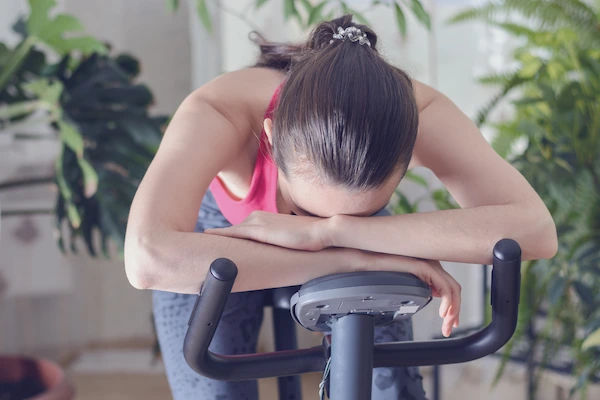How to Reduce Dizziness: Effective Tips and Treatments for Quick Relief

Written by
Last updated on 3rd Jul, 2025
Introduction
Dizziness is a common, however often unsettling, symptom that can affect people of all ages. It’s characterised by a sensation of lightheadedness, unsteadiness, or feeling faint. In some cases, dizziness may also be accompanied by nausea, confusion, or a spinning sensation (vertigo). While dizziness can sometimes resolve on its own, it can also be a sign of an underlying health issue that requires treatment. Understanding the causes of dizziness and knowing how to reduce it can significantly improve your overall well-being.
Understanding Dizziness: What Causes It?
Dizziness can manifest in various ways, and the term itself encompasses a range of different sensations. The feeling of dizziness may arise from issues within the inner ear, blood circulation, or neurological systems. Some of the most common causes of dizziness include:
1.Inner Ear Issues (Vestibular Disorders)
One of the most prevalent causes of dizziness is related to problems with the inner ear. The inner ear is responsible for helping the body maintain balance. Disorders such as benign paroxysmal positional vertigo (BPPV), Meniere’s disease, and labyrinthitis can lead to vertigo—a spinning sensation that may worsen when moving the head.
2.Blood Pressure Abnormalities
Both high and low blood pressure can cause dizziness. Low blood pressure, or hypotension, often results in a feeling of lightheadedness, particularly when standing up too quickly. Hypoglycemia (low blood sugar) is another potential culprit for dizziness, especially in people with diabetes or those who haven’t eaten in a while.
3.Medication Side Effects
Certain medications, especially those used to treat hypertension, anxiety, and depression, can have dizziness as a side effect. Other medications that affect the central nervous system may also lead to dizziness or balance issues.
4.Neurological Conditions
Conditions such as strokes, migraines, and vestibular disorders can lead to dizziness. Strokes, especially those affecting the cerebellum or brainstem, may impair balance and coordination, leading to dizziness. Migraines, on the other hand, can trigger dizziness as part of a broader symptom complex.
5.Circulatory Problems
Dizziness can also result from problems in the circulatory system, such as anaemia, which reduces the oxygen supply to the brain. A lack of oxygen-rich blood flow can cause a sense of faintness or dizziness.
6.Dehydration and Vitamin Deficiencies
Dehydration, especially in hot weather or after exercise, can cause dizziness. Not drinking enough water lowers your blood volume and can drop your blood pressure, which leads to dizziness. Also, not having enough vitamins, like B12 and iron, can make you feel dizzy.
Consult Top Doctors for Personalised Care
Immediate Remedies for Dizziness
When you feel dizzy, taking quick action to ease the sensation can help you regain your balance and avoid further discomfort. Here are some simple ways to reduce dizziness:
1.Hydrate: Drink Plenty of Water
Dehydration is a common cause of dizziness, and drinking water can help you feel better quickly. Water replenishes the fluids in your body, improving circulation and stabilising blood pressure. If dehydration is the cause, try drinking at least 8 ounces of water every 30 minutes until you start feeling better. Electrolyte drinks can also help, especially if you’re very dehydrated.
2.Ginger: A Natural Solution
Ginger is a popular natural remedy for nausea and dizziness. It has been used for centuries to help with vertigo, nausea, and motion sickness. You can have ginger in tea or food. It helps by calming nausea and improving circulation, which can reduce dizziness caused by problems with your inner ear or nausea.
3.Rest and Move Slowly
One of the easiest ways to stop dizziness is to sit or lie down in a quiet place. If you feel lightheaded, don’t try to push through it. Sudden movements can make dizziness worse, so avoid standing up too fast or turning your head quickly. Resting and taking your time to regain your balance can help you feel steady again.
4.Fresh Air
Sometimes, dizziness is caused by poor air quality. If you’re in a stuffy or warm room, stepping outside for some fresh air can help. Fresh air improves circulation and provides oxygen, which can help you feel more balanced and clear-headed.
These simple steps can provide quick relief from dizziness, helping you feel more stable and comfortable.
Medical Treatments for Dizziness
If dizziness persists or is accompanied by other concerning symptoms, it may be necessary to seek medical attention. Below are some medical treatments used to address the underlying causes of dizziness:
1. Medications
For certain causes of dizziness, medications can be prescribed to help reduce symptoms. For example, antihistamines or anti-nausea medications may be used to treat dizziness associated with vertigo. In cases of motion sickness, medications like meclizine may provide relief. If dizziness is due to low blood pressure or low blood sugar, treating the underlying condition with appropriate medications can help.
2. Vestibular Rehabilitation Therapy
Vestibular rehabilitation therapy (VRT) is a form of physical therapy designed to treat dizziness caused by inner ear disorders, such as BPPV or Meniere’s disease. VRT includes exercises that help improve balance, reduce dizziness, and retrain the brain to adapt to changes in the inner ear’s signals. A trained physical therapist typically leads this therapy.
3. Surgical Options
In rare cases, dizziness caused by severe inner ear conditions may require surgery. For example, a procedure called a labyrinthectomy may be used to remove part of the inner ear in cases of Meniere’s disease that do not respond to other treatments. Surgery may also be needed in cases of vestibular schwannomas (tumours in the inner ear) that affect balance.
Long-Term Prevention and Management of Dizziness
To prevent future episodes of dizziness and improve overall health, it’s important to focus on long-term strategies that can enhance balance, circulation, and overall well-being.
1. Eat a Balanced Diet
A nutritious diet is essential for preventing dizziness related to vitamin deficiencies and low blood sugar. Ensure you’re consuming enough iron-rich foods (e.g., spinach and red meat) to prevent anaemia and maintain healthy circulation. Additionally, including B12-rich foods like eggs, dairy products, and fortified cereals can prevent vitamin B12 deficiencies that lead to dizziness.
2. Regular Exercise
Physical activity can improve circulation, increase oxygen delivery to the brain, and help regulate blood pressure. A regular exercise routine that includes cardiovascular activities, strength training, and balance exercises can reduce the likelihood of dizziness caused by poor circulation and balance disorders. Always consult a doctor before starting a new exercise routine, especially if you have existing health conditions.
3. Manage Stress
Stress and anxiety can exacerbate dizziness by triggering hyperventilation, which can lead to feelings of lightheadedness. Practising relaxation techniques such as deep breathing, meditation, or yoga can help manage stress levels and reduce dizziness. Avoiding excessive caffeine and alcohol can also help reduce symptoms associated with anxiety-induced dizziness.
4. Regular Check-Ups
To make sure your dizziness isn’t caused by a medical problem, it’s important to have regular check-ups with your doctor. Checking things like blood pressure, blood sugar, and overall health can help prevent dizziness linked to these conditions. It’s also helpful to keep an eye on your ear health and treat any ear infections or balance problems early to stop dizziness from coming back.
Conclusion
Dizziness is common but can be worrying and interfere with daily life. However, with the right steps, you can reduce and even prevent it. By understanding what causes dizziness, using quick remedies, getting medical treatment when needed, and living a healthy lifestyle, you can manage and lessen dizziness. If your dizziness is persistent or severe, it's important to talk to a doctor to find the cause and get the right treatment. Taking proactive steps today can help you feel more stable and balanced tomorrow. Always remember, your health and safety come first—if dizziness becomes a frequent issue, don’t hesitate to seek medical advice.
Consult Top General Physicians
Consult Top Doctors for Personalised Care

Dr. Amit Pandita
Gastroenterology/gi Medicine Specialist
10 Years • MBBS. MD (INTERNAL MEDICINE) DrNB (GASTROENTEROLOGY AND HEPATOLOGY)
Delhi
Apollo Hospitals Indraprastha, Delhi

Dr Yaja Jebaying
Paediatric Gastroenterologist
9 Years • MBBS, MD PEDIATRICS, FELLOWSHIP PEDIATRIC GASTROENTEROLOGY AND HEPATOLOGY AND LIVER TRANSPLANTATION
Delhi
Apollo Hospitals Indraprastha, Delhi
(25+ Patients)

Dr Piyush Vishwakarma
Gastroenterology/gi Medicine Specialist
11 Years • MBBS, MD, DrNB,
Delhi
Apollo Hospitals Indraprastha, Delhi

Dr. Manju Kamal
Nephrologist
12 Years • MBBS,MD(General Medicine), DNB,DM(Nephrology)
Angamaly
Apollo Hospitals Karukutty, Angamaly

Dr. Nishant Rana
Ent Specialist
8 Years • MBBS. MS ENT
Delhi
Apollo Hospitals Indraprastha, Delhi
Consult Top General Physicians

Dr. Mohamed Azeem
General Physician/ Internal Medicine Specialist
2 Years • MBBS,MD(Internal Medicine) CCEBDM
Karaikudi
Apollo Hospitals Karaikudi, Karaikudi

Dr. Mary Susan K S
General Physician/ Internal Medicine Specialist
13 Years • MBBS, MD INTERNAL MEDICINE
Bengaluru
Apollo Clinic, Sarjapur Road, Bengaluru

Dr. Swagata Sircar
General Physician/ Internal Medicine Specialist
8 Years • MBBS, MD General Medicine
Kolkata
HealthYou Speciality Clinic & Diagnostics., Kolkata
(50+ Patients)

Dr. Smitha Nagaraj
General Physician/ Internal Medicine Specialist
15 Years • MBBS, Diploma in Family Medicine
Bengaluru
Apollo Medical Center, Marathahalli, Bengaluru

Divyashree K
General Physician/ Internal Medicine Specialist
5 Years • MBBS
Bengaluru
Apollo Clinic, JP nagar, Bengaluru


